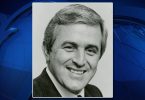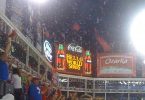Intense is too calm a word for the John Wetteland I knew.
He wasn’t just intense about baseball, either. He was passionate about everything he did, whether it was pitching with the bases loaded in the ninth inning, raising money to help kids, or talking about his faith.
It was that penetrating gaze of his, that determination to win no matter what, combined with his very real spirituality that inspired me to write a short poem for him and manager Johnny Oates sometime back in the late ‘90s, when he was helping the Rangers capture their first-ever American League West division championship.
Now don’t get the idea that writing poems was a regular thing for me. Far from it. But this one…this one was simply inspired by two men for whom I had great admiration.
I printed the poem in my weekly notes column one Sunday morning. When I got to the ballpark that evening, Oates pulled me aside to tell me how much he loved it. A few weeks later, he handed me a framed copy of the poem done up in gold calligraphy script. He’d had three of them made, one for me, one for Wetteland, and one to hang on his office wall. It stayed there during the rest of his tenure as Rangers manager.
Mine hangs on my office wall today, a reminder of the most intense player I ever saw in more than 40 years of baseball coverage and of my friend Johnny Oates, a man who managed and lived with that same kind of fire and passion.
Today, Wetteland faces a foe far more ominous and frightening than any ninth-inning, bases-loaded jam he ever confronted as a pitcher. This time it’s not Barry Bonds or Ken Griffey Jr. he must duel. This time it’s justice. It’s the horrifying experience of being accused and indicted for a crime so heinous, it makes one’s skin crawl. It’s perception. It’s the court of public opinion, played out on TV, in the newspapers and, most challenging of all, the internet, where anyone can have an opinion whether they know the facts or not.
And no one truly knows the facts right now, except Wetteland and his accuser.
Wetteland made a brief court appearance in Denton with his wife Rebecca and his attorney Derek Adame (Uh-dah-may) Monday. Adame made it clear that his client will plead not guilty to sexually assaulting a child back in 2005. He expects a trial sometime at the end of the year or in early 2020.
The court appearance prompted a story on Monday’s Star-Telegram website from former colleague Mac Engel. It was mostly pretty standard stuff. Wetteland didn’t comment. Adame proclaimed his client’s innocence and that he is looking forward to his day in court.
“The only thing worse than what he’s been accused of is murder….I can’t imagine how he’s doing, but he’s holding up,” the attorney told Engel.
He provided basically the same message when we spoke Monday afternoon, reflecting on how easy it is to accuse someone of anything these days and how the public, especially on Facebook, Twitter and other internet sites, rushes to judgment.
What jumped out at me from Mac’s story was this short paragraph:
“At least with the Texas Rangers,” Engel wrote, “Wetteland also had a terrible reputation among members of the media who covered the team. He was known to be antagonistic and a condescending bully for no reason.”
He also said, without quoting anyone, that members of the front office found him difficult.
That’s not the Wetteland I knew and covered.
That’s not to say that Engel is wrong. Obviously, our opinions are colored by our own experiences, how someone treats us personally. Just as obviously, Mac must have had one or more uncomfortable run-ins with Wetteland.
Like I said, if nothing else Wetteland was intense and complex. There was nothing simple about him. He played the guitar, the clarinet and the saxophone. He had gone through his wild-child period back when he pitched in LA and Montreal, wearing a black leather motorcycle jacket as he tooled around on his Harley. He rumbled through life, on and off the field, with a chip the size of a Louisville Slugger on his shoulder.
He had left most of that anger behind by the time he arrived in Texas, after establishing himself as a premier closer for the New York Yankees, though he would still occasionally break out the jacket and hop on his new bike.
He was intelligent and had little patience for the ill-prepared and those who asked the inane questions that all baseball writers must ask at times. He could be aloof and sharp-tongued, sometimes barreling across the line between bluntness and rudeness.
I’ve heard, though never saw it, that he treated members of the team’s traveling TV crew badly on road trips, specifying what parts of the plane they could be in, displaying a petty we’re-the-ballplayers-and-you’re-not attitude. He was old school that way. He protected his and his teammates’ privacy, even when it wasn’t necessary.
Despite the Christianity he wore like a badge of honor, Wetteland would never be mistaken for a choir boy.
Officially the Rangers have made no comment about Wetteland’s dilemma, waiting for the legal process to play out. But as a front office source told me Monday, John almost always made himself available to the media, whether he saved the game or blew it. Most of the time he spoke softly, accepted responsibility if he had pitched poorly, and calmly answered the post-game questions posed to him by reporters on deadline. If anyone in the front office had problems with him, the source said, he wasn’t aware of it.
I covered John regularly as a columnist for all four seasons that he was helping bring the Rangers from the doldrums of mediocrity to the heady heights that only winners know. Two of the three division titles they won over four seasons would not have happened without him.
We developed a rapport and mutual respect over those four years. Much of that was born from those quiet times when Wetteland, Johnny Oates and I would sit in the manager’s office and talk about our faith journeys, what we had learned, where we had failed, the men we still hoped to become.
During his four years in Texas, he and his then-wife Michelle worked with the Feed the Children organization to help flood victims in the Midwest, regularly conducted April toy drives at the ballpark, and hosted the annual Diamond Ball to benefit cystic fibrosis. He gave money to Feed the Children for each save and hosted the 1998 Athletes in Action youth clinic at the Dr Pepper Ballpark. Doing good was a mission for him. There is no telling how much money Wetteland helped raise for charity.
None of that really matters now. Wetteland is fighting for his freedom, not to win a baseball game or championship. That poem I wrote 20 years ago was about salvation, and John Wetteland, one of the best shutdown relievers in baseball history, needs his own personal closer now.
So here it is again, John Wetteland. Frankly, it’s much more applicable today than it was two decades ago.
The Closer
When I’ve reached the final innings
And the day is getting late,
When the foe has the bases loaded
And ol’ Satan’s steppin’ to the plate,
And the manger strolls to the mound,
To the ump growls, “He’s had enough.”
And turns to wave to the bullpen,
‘Cause it’s plain I’ve lost my stuff.
As the bullpen gate swings open,
And The Closer looms into view,
As the crowd rises with a roar,
Lord, please let it be you.







